Daily Vocabulary Words: List of Daily Used Words in Leading International Newspapers
Hi there. Welcome to this special section @ Wordpandit.
Our endeavour here is very simple: to highlight important daily vocabulary words, which you would come across in leading newspapers in the country. We have included the following newspapers in our selection:
• The New York Times
• The Washington Post
• Scientific American
• BBC
• The Guardian
• Psychology Today
• Wall Street Journal
• The Economist
We are putting in extensive work for developing your vocabulary. All you have got to do is be regular with this section and check out this post on a daily basis. This is your repository of words that are commonly used and essentially, we are posting a list of daily used words. Hence, this has significant practical application as it teaches you words that are used commonly in leading publications mentioned above.
Visit the website daily to learn words from leading international newspapers.
WORD-1: Stagnant
CONTEXT: For millenniums before that, economic growth had been basically stagnant.
SOURCE: [Source Name]
EXPLANATORY PARAGRAPH: Imagine a small pond where the water doesn’t move. It just sits there without flowing. This water is stagnant. It means not moving, not flowing, just staying still. Sometimes, it can also mean not changing or growing.
MEANING: Having no current or flow; not moving or changing (adjective).
PRONUNCIATION: stag-nuhnt
SYNONYMS: Motionless, Static, Still, Inactive, Sluggish, Unchanging.
USAGE EXAMPLES:
1. The stagnant water became a breeding ground for mosquitoes.
2. His career was stagnant and needed a change.
3. The market has been stagnant for months.
4. The air in the room felt stagnant and heavy.
WORD-2: Constellation
CONTEXT: It seems banal, but division of labor was part of a constellation of ideas that liberated our civilization from the savage grip of zero-sum thinking.
SOURCE: [Source Name]
EXPLANATORY PARAGRAPH: Look up at the night sky and you might see groups of stars that form a shape, like a big bear or a hunter. These groups are called constellations. They are patterns of stars that people have named and told stories about.
MEANING: A group of stars forming a recognizable pattern (noun).
PRONUNCIATION: kon-stuh-lay-shuhn
SYNONYMS: Star pattern, Astral formation, Celestial grouping, Star cluster, Galaxy, Nebula.
USAGE EXAMPLES:
1. The constellation Orion is easy to spot in the night sky.
2. Ancient sailors navigated using constellations.
3. She loved studying the constellations and their myths.
4. The new telescope revealed distant constellations.
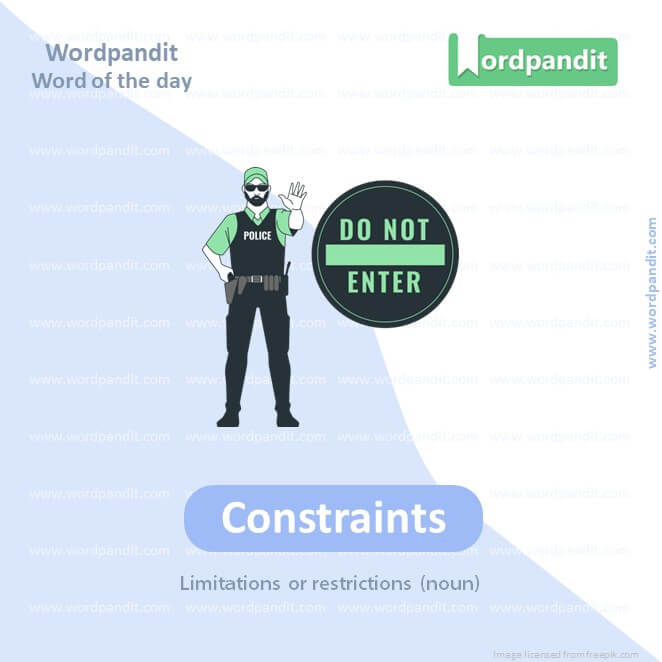
WORD-3: Constraints
CONTEXT: Once those informal, unwritten constraints are off, there is little that will stand in his way.
SOURCE: Guardian
EXPLANATORY PARAGRAPH: Think about having to stay inside a small play area and not being able to go outside it. These limits are like constraints. They are rules or limits that stop you from doing whatever you want.
MEANING: Limitations or restrictions (noun).
PRONUNCIATION: kuhn-straynts
SYNONYMS: Restrictions, Limitations, Bounds, Confinements, Controls, Inhibitions.
USAGE EXAMPLES:
1. Budget constraints limited their options.
2. Time constraints made the project challenging.
3. The constraints of the law must be respected.
4. She worked creatively within her constraints.
WORD-4: Adherents
CONTEXT: They do not need a wide community of adherents to make themselves look like a movement.
SOURCE: New York Times
EXPLANATORY PARAGRAPH: Imagine a group of people who all believe in the same thing or follow the same leader or teacher. These people are adherents. They stick to a certain belief, group, or leader because they agree with them.
MEANING: Followers of a particular leader, party, or belief (noun).
PRONUNCIATION: ad-heer-uhnts
SYNONYMS: Followers, Supporters, Disciples, Devotees, Partisans, Believers.
USAGE EXAMPLES:
1. The political party had many adherents.
2. Adherents of the movement spread its message.
3. She gained a large number of adherents online.
4. The philosophy’s adherents met regularly.
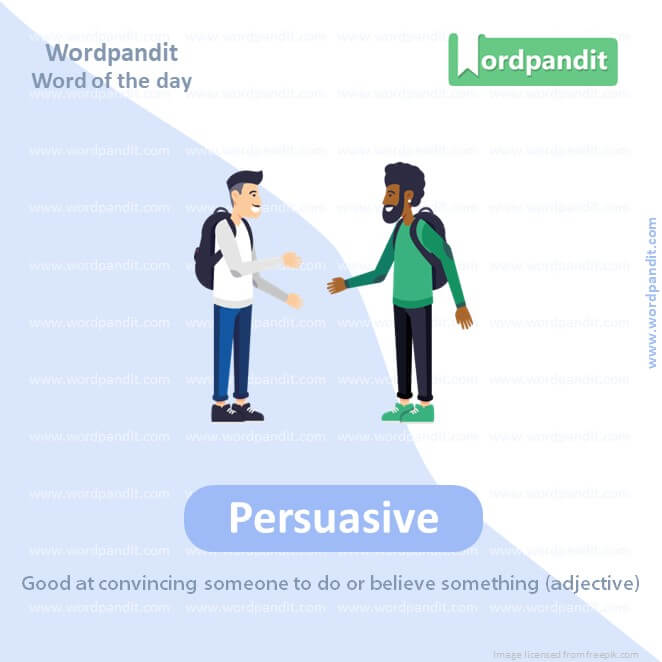
WORD-5: Persuasive
CONTEXT: She makes the persuasive case that even if he does not formally withdraw from the alliance, Trump can render it defunct simply by shaking confidence in its central commitment: that each member come to the defense of any other if attacked.
SOURCE: Guardian
EXPLANATORY PARAGRAPH: Imagine someone who is really good at talking and can make others agree with them or do something. This person is persuasive. It means they have a special way of convincing people or making them see things their way.
MEANING: Good at convincing someone to do or believe something (adjective).
PRONUNCIATION: per-sway-siv
SYNONYMS: Convincing, Influential, Compelling, Eloquent, Effective, Forceful.
USAGE EXAMPLES:
1. Her argument was very persuasive.
2. He had a persuasive manner of speaking.
3. The advertisement was designed to be persuasive.
4. She used persuasive techniques to win the debate.
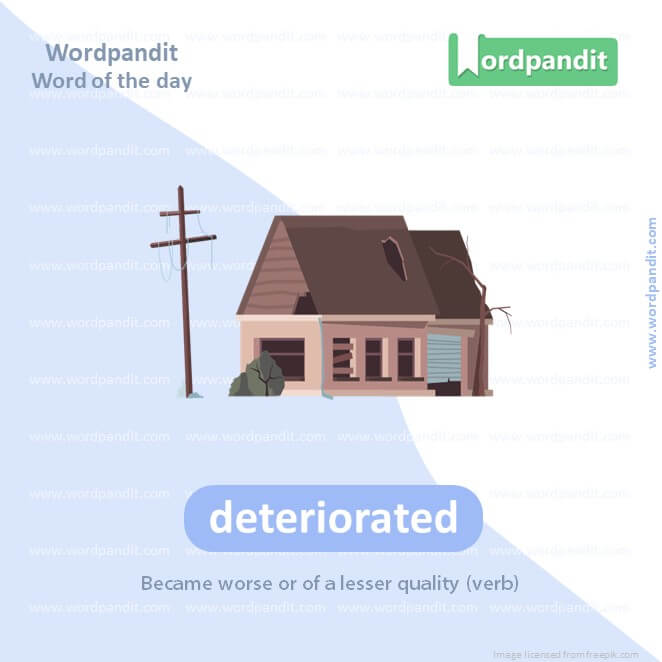
WORD-6: Deteriorated
CONTEXT: He was also one of the architects of the rapprochement between Hamas on the one hand, and Iran, Hezbollah and Syria on the other, after ties had deteriorated in the wake of the Syrian war.
SOURCE: Guardian
EXPLANATORY PARAGRAPH: Think about a toy left outside for a long time. It might get rusty, break, or not look as nice as before. That’s what it means to deteriorate. It’s when something gets worse over time.
MEANING: Became worse or of a lesser quality (verb).
PRONUNCIATION: dih-teer-ee-uh-ray-tid
SYNONYMS: Declined, Degraded, Worsened, Decayed, Degenerated, Spoiled.
USAGE EXAMPLES:
1. The building’s condition deteriorated over the years.
2. His health deteriorated rapidly.
3. The situation deteriorated into chaos.
4. The paint on the walls had deteriorated.
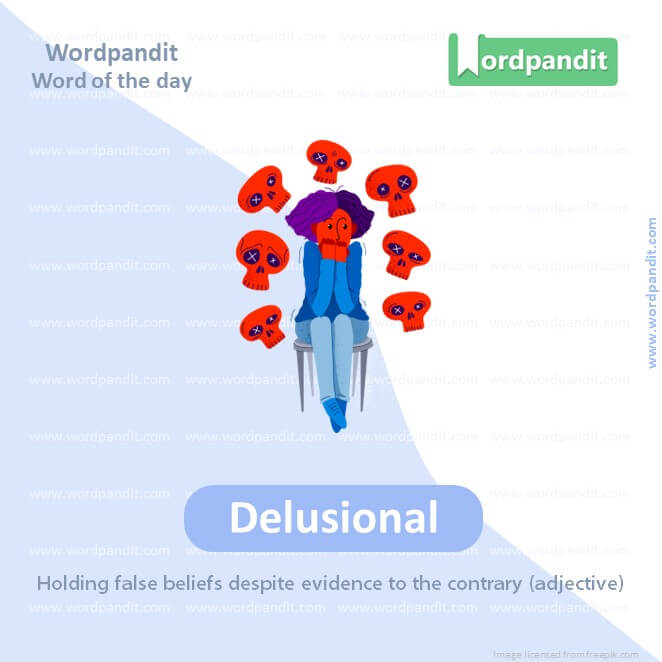
WORD-7: Delusional
CONTEXT: The go-it-alone fantasies of the Brexit era were always delusional.
SOURCE: Guardian
EXPLANATORY PARAGRAPH: Imagine someone who believes they can fly like a bird, even though humans can’t do that. This belief is not real; it’s like a fantasy. When someone strongly believes something that’s not true, they’re being delusional.
MEANING: Holding false beliefs despite evidence to the contrary (adjective).
PRONUNCIATION: dih-loo-zhuh-nuhl
SYNONYMS: Unrealistic, Illusory, Misguided, Fanciful, Irrational, Hallucinatory.
USAGE EXAMPLES:
1. The patient was suffering from delusional thoughts.
2. His delusional ideas made him unpopular.
3. She was delusional about her singing abilities.
4. The delusional man believed he was a historical figure.
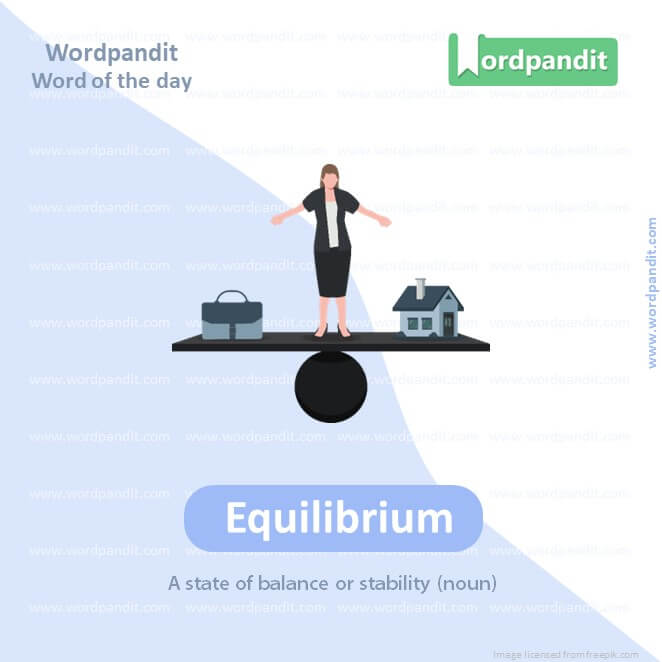
WORD-8: Equilibrium
CONTEXT: In its eyes, a clear response will be the only way to restore equilibrium.
SOURCE: Guardian
EXPLANATORY PARAGRAPH: Think about balancing equally on both feet, not leaning to one side. That’s like equilibrium. It’s when things are balanced or stable, not too much of one thing or another. It can be about balance in your body, mind, or even in nature.
MEANING: A state of balance or stability (noun).
PRONUNCIATION: ee-kwuh-lib-ree-uhm
SYNONYMS: Balance, Stability, Evenness, Poise, Harmony, Steadiness.
USAGE EXAMPLES:
1. The ecosystem must maintain its equilibrium.
2. She lost her equilibrium and fell.
3. The market is in a state of equilibrium.
4. He struggled to find emotional equilibrium.
WORD-9: Retaliation
CONTEXT: This would require a carefully measured retaliation that simultaneously signifies an escalation in terms of scope and intensity, but falls short of all-out war.
SOURCE: Guardian
EXPLANATORY PARAGRAPH: Imagine if someone takes your toy, and you take one of theirs to get back at them. That’s retaliation. It’s when you do something bad to someone because they did something bad to you first.
MEANING: The action of returning a military attack; counterattack (noun).
PRONUNCIATION: ri-tal-ee-ay-shuhn
SYNONYMS: Revenge, Vengeance, Reprisal, Payback, Counterattack, Recompense.
USAGE EXAMPLES:
1. They threatened retaliation for the attack.
2. Retaliation against the bullies was not the answer.
3. The strike was an act of retaliation.
4. He feared retaliation from his opponents.
WORD-10: Emboldened
CONTEXT: The rest of higher education will find it harder. Networked, nationalized, and emboldened, Rufo has nothing standing in his way.
SOURCE: New York Times
EXPLANATORY PARAGRAPH: Imagine getting a big hug from your best friend right before you do something scary. You feel stronger and braver, right? That’s what emboldened means. It’s when you feel more confident and brave because of something or someone.
MEANING: Made brave or confident (verb).
PRONUNCIATION: em-bol-duhnd
SYNONYMS: Encouraged, Strengthened, Fortified, Inspired, Heartened, Empowered.
USAGE EXAMPLES:
1. She was emboldened by the support of her friends.
2. The success emboldened him to try even harder.
3. The crowd’s cheers emboldened the team.
4. His words emboldened her to speak out.
Vocabulary Meaning
In the ocean of language learning, ‘vocabulary meaning’ is akin to the colorful coral reefs that add depth and vibrancy to communication. Yet, infusing our interactions with this vibrancy is often a challenge for many language learners. The crux lies in effectively deciphering and employing the ‘vocabulary meaning’.
Learning ‘vocabulary meaning’ isn’t about merely gluing words to their definitions. It’s about forming a deep understanding and connection with these words that transcends rote learning. To gain a comprehensive grasp of ‘vocabulary meaning’, one needs to navigate beyond textbook definitions and commit to exploiting diversified resources such as novels, films, music, articles, and digital content. This allows one to encounter vocabulary in a variety of contexts and actual usage, giving deeper insight into their meaning.
However, understanding ‘vocabulary meaning’ involves another essential aspect—memory retention. Techniques such as spaced repetition and the Leitner System offer effective methodologies to maintain and consolidate the ‘vocabulary meaning’. Additionally, leveraging mnemonic strategies can help etch words into your memory by linking them with unique stories or imagery that are personal and easily recallable.
Another way of mastering ‘vocabulary meaning’ is by immersing yourself in the language. Engage in regular conversations with native speakers if possible or utilize language exchange platforms to practice your skills. This not only bolsters your understanding of how the vocabulary is used but also helps articulate the ‘vocabulary meaning’ in the societal and cultural contexts.
In conclusion, gaining a robust grasp of ‘vocabulary meaning’ is a journey rather than an end goal. It requires dedication, perseverance and most importantly, a multi-faceted approach that includes diversified resources, effective memory strategies, and real-life application. With these strategies in place, the depths of ‘vocabulary meaning’ are no longer daunting but become an enchanting exploration of language.







